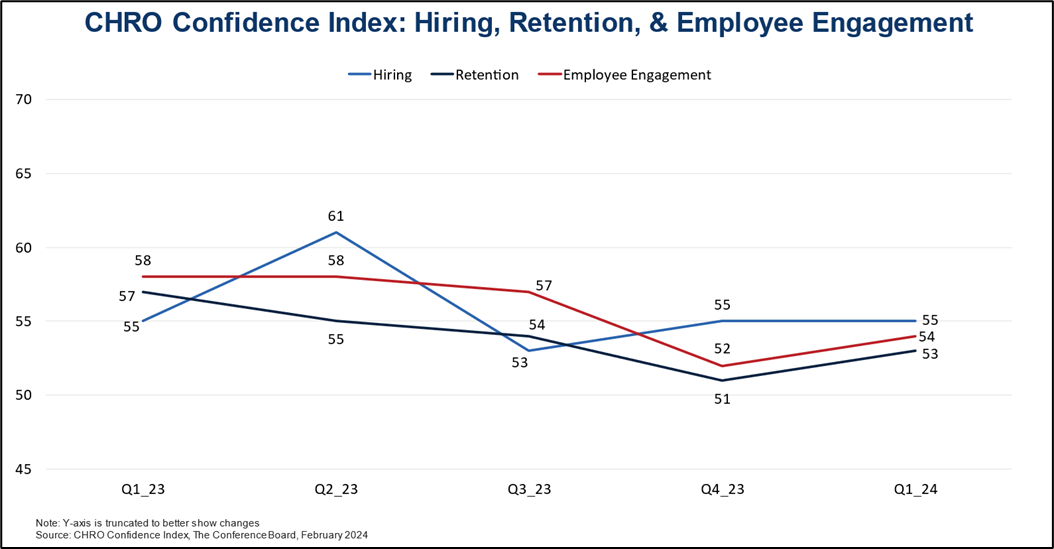


Members of The Conference Board get exclusive access to the full range of products and services that deliver Trusted Insights for What's Ahead ® including webcasts, publications, data and analysis, plus discounts to conferences and events.
22 March 2024 | Press Release
Corporate America’s HR leaders continue to be more optimistic than pessimistic about the state of the workforce.
The Conference Board CHRO Confidence Index ticked up to 54 in Q1, from 53 last quarter. (A reading of more than 50 points reflects more positive than negative responses.) While retention and engagement expectations improved from last quarter, the survey reveals they are down compared to this time last year, signaling ongoing concerns about labor shortages. Hiring expectations remained stable.
The survey also reveals that businesses are stepping up as mental health concerns continue taking a toll on workers throughout the nation: 42% of surveyed companies plan to offer new well-being benefits this year.
Indeed, 36% say businesses are responsible for the well-being of their employees, with another 62% saying they are somewhat responsible. As a result, they are ramping up their focus on employee wellness: In addition to those offering new well-being benefits, a quarter plan to increase spending on well-being initiatives.
“Taking a holistic view of worker well-being can not only improve employee engagement and productivity but also retain your talent—a top focus of both CEOs and CHROs this year,” said Diana Scott, Leader of The Conference Board US Human Capital Center.
The Index, conducted quarterly, was launched in Q1 2023 and is comprised of three components—hiring, retention, and engagement—as well as special questions included in each survey. Nearly 150 CHROs participated in the Q1 survey, which included additional questions on employee well-being. Key findings include:
Hiring
The CHRO Confidence Index: Hiring component remained the same as both last quarter and YoY, at 55.
CHROs’ workforce expansion plans remained stable in Q1, with fewer CHROs expecting to increase or decrease hiring in the next six months:
Retention
The CHRO Confidence Index: Retention component rose to 53 in Q1 2024 from 51 in Q4 2023. But retention expectations are down YoY from 57 in Q1 2023.
CHRO expectations regarding employee retention ticked up slightly in Q1:
Engagement
The CHRO Confidence Index: Engagement component rose to 54 in Q1 2024 from 52 in Q4 2023. But engagement expectations are down YoY from 58 in Q1 2023.
Fewer CHROs expect declines in employee engagement in Q1:

Special Questions for Q4: Employee Well-Being
For Q1 2024, the Index also surveyed CHROs on employee well-being.
CHROs overwhelmingly agree that organizations share responsibility for their employees’ well-being.
A quarter of CHROs increased spending on employee well-being in 2024.
Nearly half of CHROs plan to offer new well-being benefits, despite most keeping spending the same.
Mental and physical health are the top priorities for new well-being initiatives.
Media Contacts
KPuello@tcb.org
About The Conference Board
The Conference Board is the member-driven think tank that delivers Trusted Insights for What’s Ahead®. Founded in 1916, we are a non-partisan, not-for-profit entity holding 501 (c) (3) tax-exempt status in the United States. www.conference-board.org
Media Contact:
Joseph DiBlasi
jdiBlasi@tcb.org
HC Insights: To retain talent, honor implicit psychological agreements
February 24, 2025
HC Insights: To align with CEOs, prioritize talent and productivity
February 17, 2025

